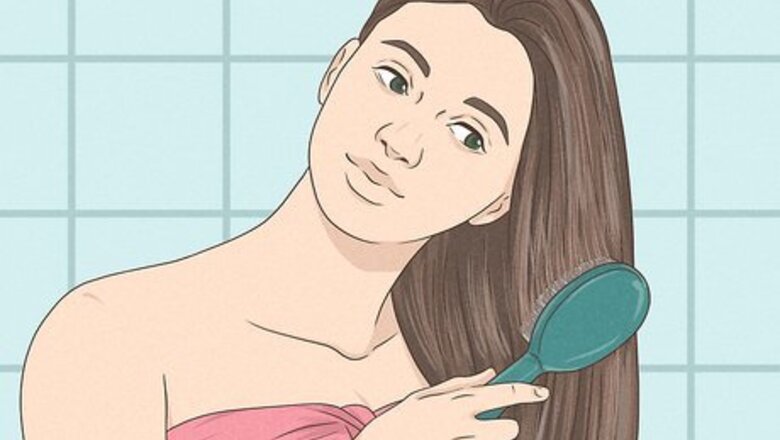
views
Maintaining Straight Hair Overnight
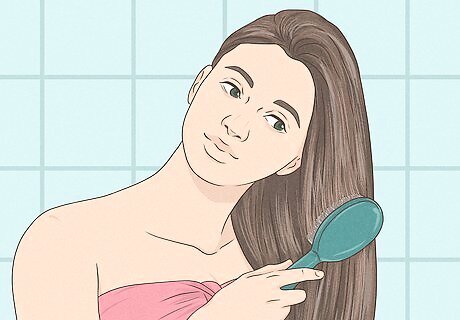
Brush wet, naturally straight hair out and dry it completely before bed. If your hair is mostly straight or just slightly wavy, try shampooing and conditioning it before bed. Brush your hair with a paddle brush or wide tooth comb to remove tangles, and either allow your hair to air dry or blow it dry using your brush and downward strokes with the blow dryer. Be sure your hair is completely dry before going to bed, since even a bit of dampness can cause waves or frizz overnight. Use shampoos and conditioners labeled “smoothing” and don’t contain sulfates, which dry out your hair and make it frizzy.
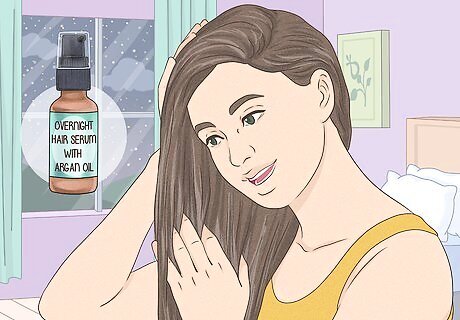
Apply an overnight straightening treatment to coarse or frizzy hair. If your hair is naturally coarse or frizzy, use a smoothing oil, serum, or cream before you go to bed. Good products to use contain Argan oil or coconut oil. Squeeze a dime-sized amount of product on your fingers and rub it through your hair from the roots to the tips. Comb the product through your hair with a fine-tooth comb to ensure that you get every strand coated.
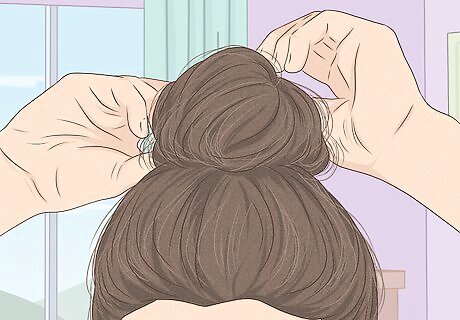
Try a loose top-bun for an easy morning. Brush your naturally straight or straightened hair out and up toward the top of your head. Use an elastic hairband to make a loose ponytail, then create a bun by wrapping your hair in a circle around the center of the ponytail. Fasten the bun loosely with a fabric scrunchie. In the morning, remove the bun and brush out your hair until it’s straight. This technique works best combined with others, such as sleeping on a silk or satin pillowcase or using overnight straightening serums.
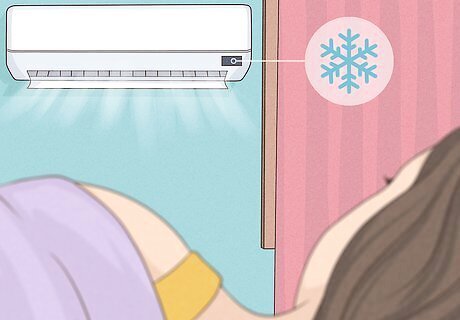
Keep your bedroom cool. Sweating at night can increase curls and hair frizz. Set your thermostat or air conditioner so that your bedroom remains as cool as you can stand it, or leave windows open on cool evenings.
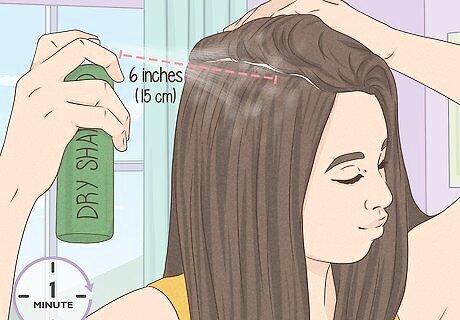
Reduce oil with dry shampoo on fine, straight hair. If your hair is naturally straight and fine, it may be prone to oiliness. Instead of washing your hair every night, try using a dry shampoo to control the oil and maintain volume in your hair. Spray the dry shampoo about 6 inches (15 cm) away you’re your roots and allow it to sit on your hair for 1 minute before working it into your roots with your fingers. If you’re using powdered dry shampoo, use 1 or 2 shakes of powder at your roots and begin massaging it into your scalp. Add more to different places on your roots as needed.
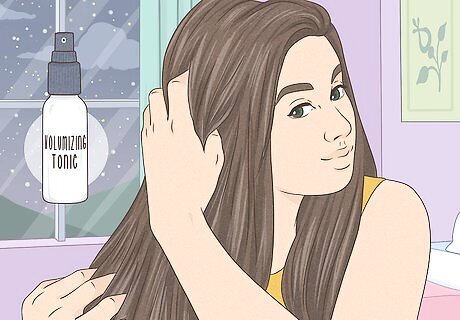
Use a volumizer before bed. If your hair is naturally fine and straight, it may benefit from a volumizing tonic. Squeeze a dime-sized amount of tonic on your fingers and run your fingers through your hair when it’s damp. For added volume, secure your hair in a top-knot, loose bun, jumbo rollers, or braids after applying the tonic.
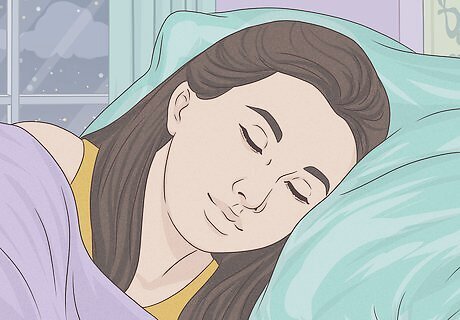
Sleep with a silk or satin pillowcase. If wrapping your hair in a scarf doesn’t sound appealing, you can gain the benefits of having silk or satin against your hair overnight by buying a pillowcase made from 1 of these materials. The pillowcase will reduce the amount of friction against your hair as you move your head throughout the night. Look for silk or satin pillowcases online in department stores where bedding items are sold. Even if you do not use a scarf, it’s still recommended you wrap your hair to minimize tangles while you sleep.
Wrapping Straightened Hair
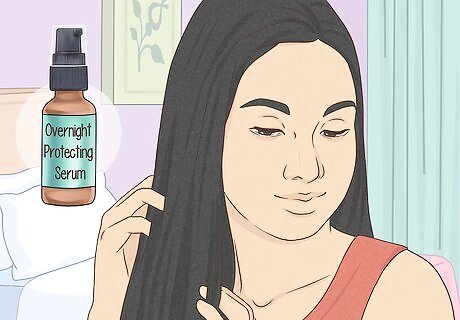
Apply an overnight protecting serum to your hair with your fingers. To help preserve your straightened hair, use an overnight serum that’s low in alcohol and high in keratin protein to sleep in. Squeeze a dime-sized amount of serum onto your fingertips, and work the serum into your hair using downward strokes.
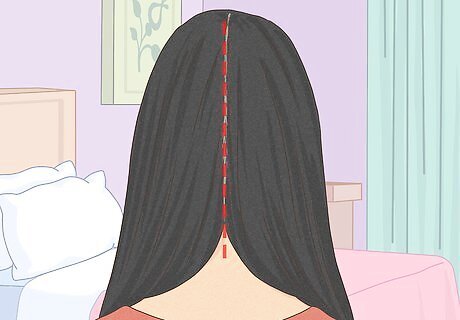
Part your hair down the middle in the back. You will need to have your hair in 2 sections for this wrap technique. Use a comb or hair pick to make a part in the center back of your head. Tilt your head down, place your comb or at the back of your head and center it to create the part. If you have a side part in front, you can create a middle part there as well to have an equal amount of hair in both sections, but it’s optional.
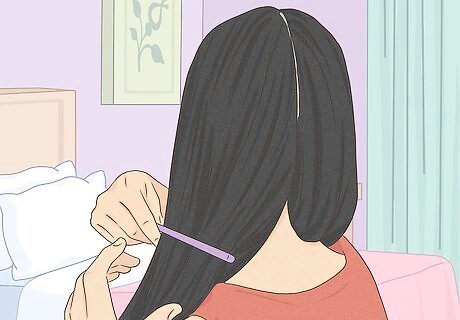
Brush your hair out while keeping the part. Brush out your hair, first brushing it forward away from your new part in the back. Then brush the front towards the back on each side, so that you have 2 evenly sized chunks of hair on each side. It may help to loosely tie a hairband around 1 side to keep it from joining the other side as you start the next step.
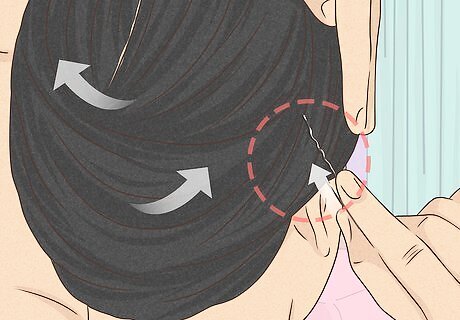
Wrap each half of your hair tightly around the back of your head. Gather the hair on the left side of your head, about midway up in the back, as if you were going to make a pigtail. Bring the section tightly over the back of your head, so that the ends rest on the right side of your head and secure it with 1 curved bobby pin if your hair is newly styled. Do the same thing with the right section of hair, wrapping it tightly around the back of your head toward the left. If you have a left side part, wrap your hair going to the right. If you have a right side part, wrap your hair to the left. If you secured either section of hair with an elastic band while parting it, remove the band before starting to wrap your hair. If your hair is very long, you may need to wrap each section around the front of your head and then back toward the back again. Be sure to keep it tight against your head.
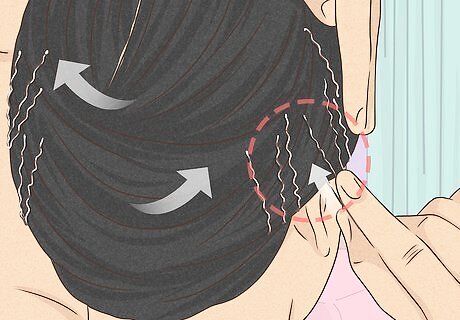
Secure the ends with curved bobby pins. After both sides of your hair are tightly wrapped around your head, use curved bobby pins to pin the ends in place. The curved pins should form to your head to reduce the number of dents they make in your hair. If your hair is very long and you had to wrap it around the front of your head too, you may need to add a few more curved pins to secure all of it in place.
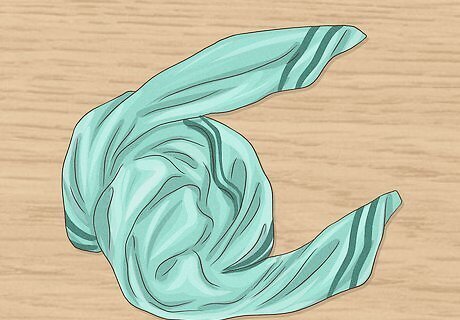
Purchase a silk or satin scarf. There are many head-wrapping scarves to choose from, but the best ones for preserving your hair overnight are silk or satin. These materials reduce friction between your hair and your pillow, thereby eliminating frizzy ends when you wake up. You can choose any bandana-style, turban-style, or neck scarf, just so long as you can wrap and tie it around your head. Large wrapping bonnets are also available, but these may allow too much room for your hair to move around and are better used on large braids or locks. Try to stick with a scarf that you can wrap and tie firmly to your head.
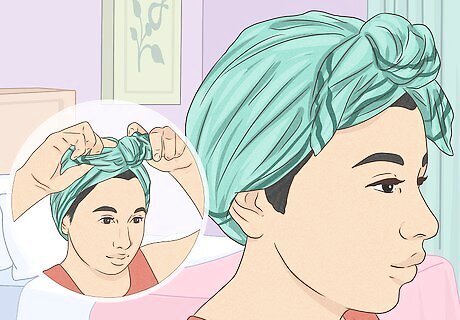
Wrap your scarf around your wrapped hair to keep it in place. Take your scarf and wrap it tightly around where you wrapped your hair. Place it flat against the back of your head, bring the sides up, and tie a knot in the front of the scarf so you don’t have to sleep on the knot. The scarf will hold your pins in place and prevent your hair from moving while you sleep.




















Comments
0 comment